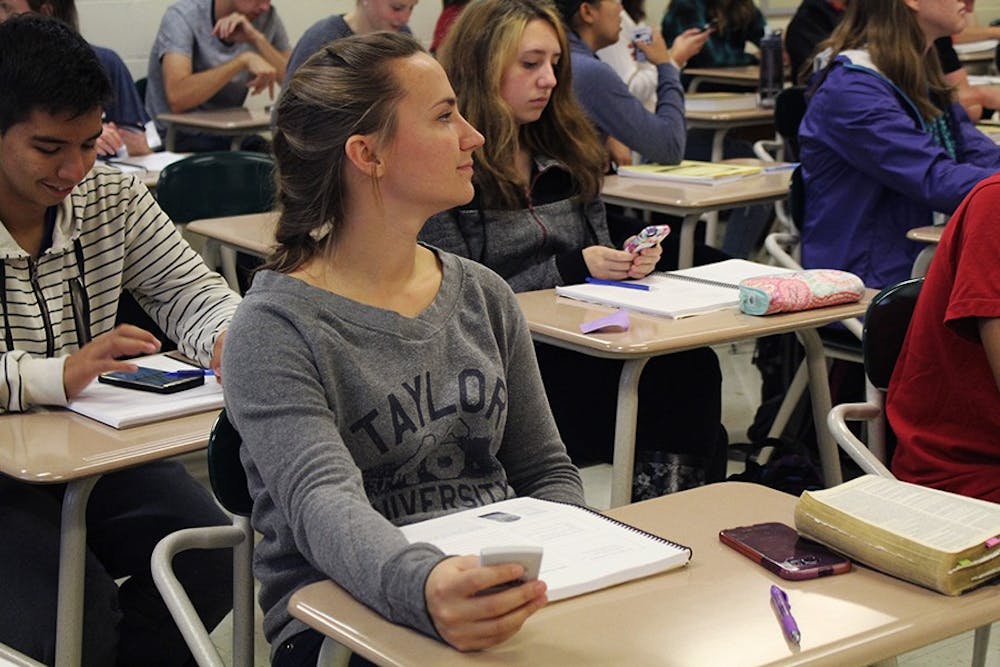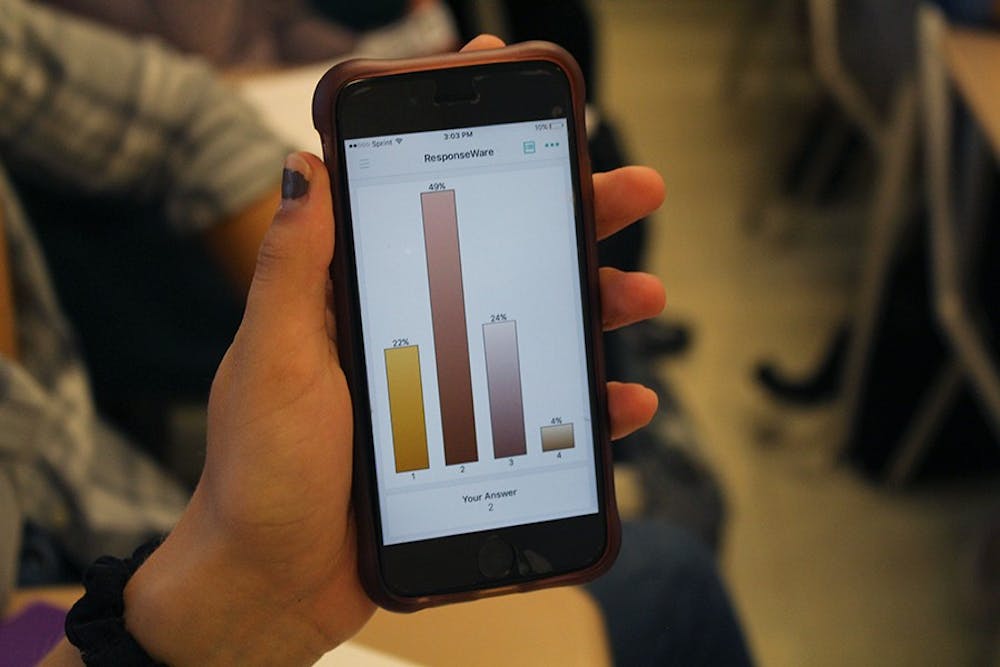By Annabelle Blair | Echo
As of this year, Taylor's in-class technology includes the possibility of using digital devices in conjunction with the new Turning Point Technology Responseware App.
The change occurred when Turning Point stopped supporting the version Taylor had been using and switched to a version called Turning Point Cloud. The Cloud program requires all users to have an account, providing access to Turning Point through any computing device-including mobile phones, laptops and tablets. In previous years, professors utilized physical clickers, often purchased from the library or bookstore, to answer quizzes or surveys in their classes. While the concept remains the same, the expansion of technology means physical clickers are no longer required to engage with the Cloud program. The decision to use physical clickers versus the digital app is entirely up to the professor.
There are a few main differences between Turning Point clickers and the app: clickers have number pads, which only allow for multiple choice answers, while Responseware apps have the features of a phone app, allowing students to enter their answers in a variety of forms. Clickers cost around $28 on top of the newly required licensing fee, which is $20-$30, depending on the license year-length.
Active Turning Point users this year include 749 students and 20 professors using either physical clickers or the app and one system administrator, Tim Ziegler. While some professors have been quick to adapt to the changes, others remain hesitant. Ziegler, Taylor's academic tech analyst, estimates that the number of professors allowing or using only the app in their classrooms is slightly less than those only allowing physical clickers.
Liz Hasenmyer, assistant professor of biology, requires students to use physical clickers. Her decision is partially based on studies she's read that show students focus better with fewer distractions and focused note-taking. She sees these concepts as a part of her role in fostering an environment in which students can learn efficiently.
However, Hasenmyer recognizes technology's ever-growing extension into traditional classroom settings: "The longer I teach, the more I think it's just not my job to police (students)." Hasenmyer may re-evaluate her policy of only using physical clickers after this semester and permit students to use the app.

Joseph Pak, professor of biblical studies, uses Turning Point to take attendance, give quizzes and conduct surveys. In this way, technology is an integral part of his teaching methods. Pak opted to allow students to buy the app and access Turning Point through their iPads, iPods and smartphones. While he acknowledged that this decision may encourage student disengagement from course material, Pak stated the economic affordability for students is worth the risk.
"When there was an option for (students) not to have to spend more money, I wanted to give them that option," Pak said. "I guess I have to try harder to encourage them to engage in class and not get sidetracked by using their smartphones."
Both Hasenmyer and Pak have experienced more difficulty with the Turning Point Cloud registration process than in previous years using physical clickers. Four weeks into the school year, both professors said a significant number of students in their classes regularly experience problems with their Turning Point devices or haven't registered their devices online.
Hasenmyer recently got a Mac, prompting compatibility issues among Microsoft, Powerpoint and Turning Point software. The process has been frustrating, but Turning Point Cloud now runs smoothly on Windows, according to Ziegler. His team spent a few long nights on the phone with software companies before Welcome Weekend, ensuring the new installation cooperated with Taylor's version of Blackboard.
Hasenmyer and her co-professor Jan Reber, professor of biology, utilize the clickers much more heavily than most professors at Taylor, Ziegler said. According to Hasenmyer, her students are given in-class assessments during lectures to gauge their understanding of course material. If less than 80 percent of the class indicates they understand the material, Hasenmyer will review the material before continuing with the day's lesson.
As someone who aims to stay on top of technology trends, Ziegler is excited to see Turning Point engage students more. He hopes Taylor will become more open to interactive technology, as it continues to advance. Smart, non-traditional classrooms that encourage a variety of teaching methods is one example of this.
Ziegler said he respects professors who don't want to use the phone app in their classes because he understands they need to maintain a teaching style that works for their respective disciplines. However, he hopes more professors will adopt app usage in the future to help keep student expenses down and better utilize the tool.





